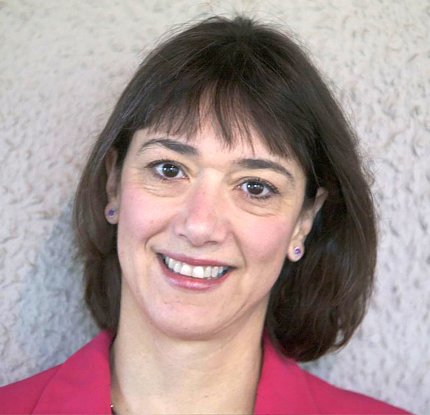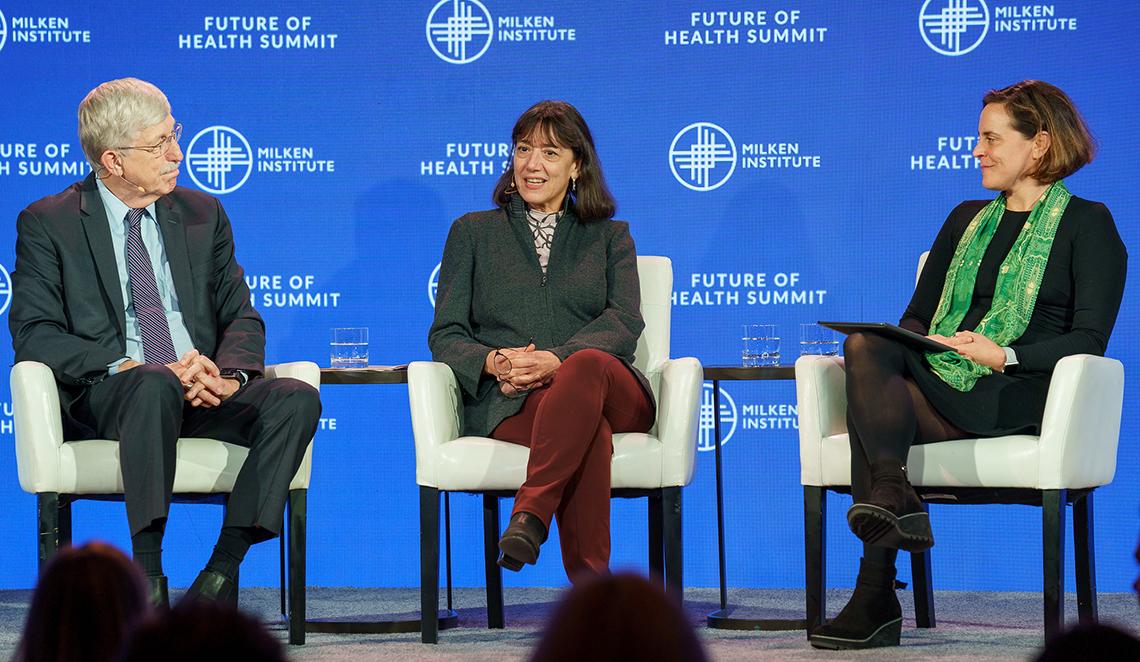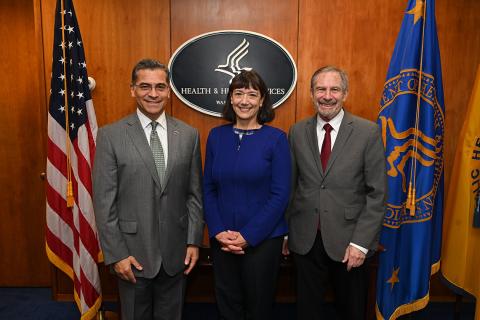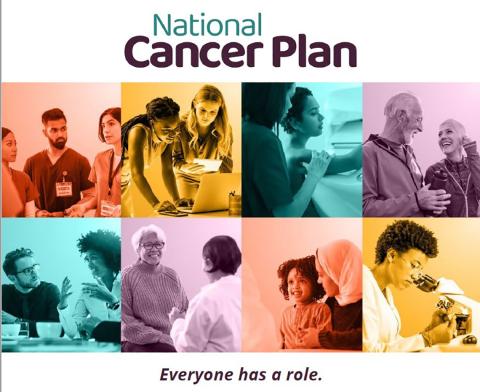‘Opportunity of a Lifetime’
Enthused to Lead NCI, Bertagnolli Has a Plan

Dr. Monica Bertagnolli arrived at NIH on a mission, and she’s asking everyone to join her. Bertagnolli—who began serving as the 16th director of the National Cancer Institute in October—has invigorated the war on cancer. Working tirelessly since her arrival, she has spearheaded a collaborative and comprehensive national cancer plan, while herself battling cancer.
A few weeks after coming to NCI, Bertagnolli was diagnosed with breast cancer. Fortunately, it was caught early and the prognosis is excellent. “I feel great,” she said during a recent interview. “I have a little more treatment to go, but I’m getting there.”
She immediately enrolled in a diagnostic clinical trial and noted that data from previous NCI-funded trials informed her treatment. “I think about that a lot—all the wonderful researchers and patients who contributed over the years,” she said. “I’m grateful for them all being there for me, because now I needed them.”
Bertagnolli has confronted cancer head-on as a surgeon, clinician, researcher and administrator. Now, as a patient, “I certainly made the same kind of decisions that I’ve seen and made with patients my whole career,” she said. “It has definitely been different being on the receiving end, but it felt comfortable because it’s a world I know really well.”
The Mission and the People
Bertagnolli is a surgical oncologist who has spent 30 years working as a physician-scientist.
The daughter of first-generation Italian and French Basque immigrants, she grew up on a ranch in Wyoming. She always loved math, chemistry and physics. “I wanted to be a doctor like my Uncle Pete,” she recalled.

Photo: Milken Institute
After medical school, surgical residency and a fellowship in tumor immunology, Bertagnolli served as a professor at Harvard Medical School, a surgeon at Brigham and Women’s Hospital and held positions at the Dana-Farber Cancer Institute.
Bertagnolli had connections to NCI long before becoming its director. Her lab conducted NCI-funded basic research on inflammation and cancer. She studied a protein called COX-2, a major driver of colon cancer. A subsequent large clinical trial yielded noteworthy results. Her team learned that the COX-2 inhibitor was a “powerful agent for preventing colon adenomas,” especially against the most advanced forms, she explained.
Unfortunately, that trial also uncovered a toxicity of the drug, a reminder of the realities of clinical research. “It teaches us things we want to know and sometimes it teaches us things we need to know but aren’t exactly thrilled to find,” she observed.
Bertagnolli also led initiatives within NCI’s National Clinical Trials Network. One of the first studies she ever conducted involved a molecular marker for colon cancer and its effects on tumor behavior. That marker was later found to predict better responses to immunotherapy.
“That’s pretty exciting,” she said, “when something you worked on a long time ago in the lab is now being used to guide clinical care.”
Throughout her career, Bertagnolli also relished helping people with cancer. “There is nothing more special than the relationship you build with your patients,” she said.
As NCI director, Bertagnolli is no longer directly involved in bench work or patient care, but said she feels fortunate to have served in multiple aspects of cancer research. “It’s a great privilege to be able to move on and do something else that’s very exciting and rewarding,” she noted.
She came to NCI, she said, for the mission and the people.
“The opportunity to work with a team at the level of NCI and NIH to achieve big results that we want to see for cancer patients…in an organization that reaches across the country and, increasingly the world, it’s the opportunity of a lifetime.”
Moonshot Reignited

Last year, President Joe Biden reignited the Cancer Moonshot, first launched with NCI in 2016, with a charge to end cancer as we know it—by improving the experience of those living with and surviving cancer and by increasingly preventing it. The call to action also included the ambitious goal of reducing cancer mortality by 50% over the next 25 years.
“I think what is truly special about Cancer Moonshot is the charge that we all work together, that everyone needs to contribute,” Bertagnolli said. “This is the first time I know of that our mandate to make progress has been articulated in just that way.”
It’s a massive and tough task. Achieving the 50% mortality reduction goal is partly achievable, she said, by applying current knowledge and eliminating disparities in care delivery. But reaching this goal also will require advances that bring new approaches to prevention, treatment and early detection.
“We have to continue our investments in basic science and technology,” she said. “We have to do a lot of work for rare cancers, which can be difficult to study, and for all of the common cancers for which we just have not made headway.”
Inspired by Cancer Moonshot and with broad input, Bertagnolli shaped a plan that NCI released in April, exactly six months to the day after her arrival.
New National Cancer Plan

The new plan was a collaborative effort across the Department of Health and Human Services and NIH institutes, with input from other agencies, the White House Office of Science and Technology Policy (OSTP) and outside partners.
“I issued a challenge to everyone to create a plan that unites everyone from the Office of the President to everyone conducting cancer research and beyond,” Bertagnolli said. “We wanted a plan that could even include two friends sitting on a park bench reminding each other to go in and get their cancer screening. We wanted a plan so comprehensive that every organization, and even every person, could see how they can play a role.”
The plan features eight goals encompassing prevention; early detection; treatments; eliminating inequities; health care delivery; data-sharing and optimizing the workforce, as well as asking every person to contribute knowledge.
To end cancer as we know it, “NCI can’t do it alone,” Bertagnolli said. “Research can’t do it alone. It’s a call for collaboration across everyone.”
Engaging Everyone
“What gives us the best opportunity to make the fastest progress is the notion of collaboration,” Bertagnolli said. “There are so many people who have been left out, who haven’t had access, who haven’t been able to participate in research. It’s crucial that we reach and engage everybody.”
The first female NCI director, Bertagnolli said she is encouraged to see more and more women in science and in leadership positions.
“I also want to see more input at all levels from many other groups who have been left out,” she said. “In tackling a problem like cancer, we can’t afford not to have full engagement across the spectrum of diversity that represents all of society.”
NCI is committed to recruiting more research participants from underrepresented groups.
“The issue of caring for every patient in the best way possible is core to everything we do,” Bertagnolli said. To that end, “throughout NCI, we have a robust and growing portfolio of research directed at health equity and eliminating disparities, ranging from basic science all the way to health care delivery and implementation research.”
To get results to people faster, Bertagnolli said, it’s critical to invest more heavily in data integration and clinical trials. “Our bandwidth is just too narrow to fully realize the capabilities we have,” she said, noting she aspires to at least double NCI’s clinical trials accruing capacity.
Energized to tackle the overarching goal at the helm of NCI, Bertagnolli looks forward to implementing and updating the new national cancer plan.
“Having at NCI both a mission that has true heart and people who share your passion for what you’re trying to achieve, I couldn’t imagine any better place to be,” she said. “It is such an honor and privilege to be in this position.”
